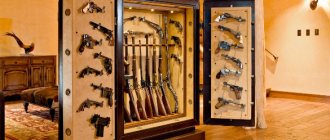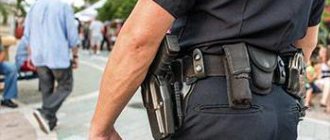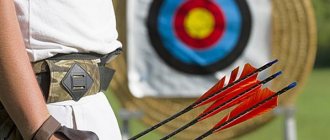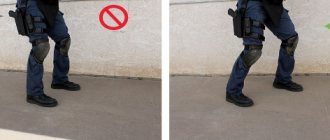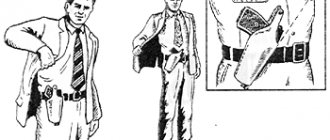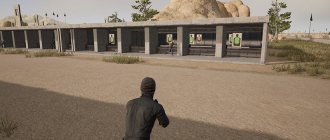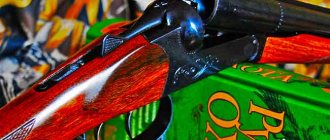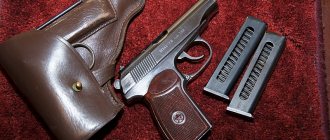1. Firing a weapon in designated places in violation of the established rules - entails the imposition of an administrative fine in the amount of three thousand to five thousand rubles with or without confiscation of the weapon and its ammunition.
2. Firing weapons in populated areas or in other places not designated for this purpose - entails the imposition of an administrative fine in the amount of forty thousand to fifty thousand rubles with confiscation of weapons and ammunition for them, or deprivation of the right to purchase and store or store and carry weapons in a term of one and a half to three years with confiscation of weapons and ammunition.
3. The action provided for in Part 2 of this article, committed by a group of persons or by a person in a state of intoxication, shall entail the imposition of an administrative fine in the amount of fifty thousand to one hundred thousand rubles with confiscation of weapons and ammunition for them or deprivation of the right to acquire and store or storage and carrying of weapons for a period of three years with confiscation of weapons and ammunition.
(Article as amended, put into effect on July 30, 2013 by Federal Law of July 2, 2013 N 177-FZ.
What does the Law on Weapons say about pneumatic weapons?
Federal Law “On Weapons” N 150-FZ came into force on December 13, 1996. A valid regulatory act regulates the rights of representatives of Federal services, legal entities and ordinary citizens to develop, acquire and use all types of weapons. Last paragraph of Art. 1 of the law in question states that sports equipment similar in design to a weapon cannot be considered such. Thus, a small air pistol is not actually considered a weapon.
As defined by this law, pneumatic equipment has little power. The energy output of the muzzle with a caliber of 4.5 mm is equal to:
- For an air pistol - from 3 to 7.5 J;
- For a hunting rifle - from 7.5 to 25 J.
However, in practice, a shot from a pneumatic gun can cause serious damage to health and even death of a person.
The law establishes that the use of pneumatic equipment should not be directed against a living creature (with the exception of hunting permitted by authorized bodies). Shooting within the city is unacceptable. Violators are subject to administrative or criminal liability depending on the degree of damage caused (in accordance with the provisions of the Administrative and Criminal Codes of the Russian Federation).
Is it possible to buy pneumatics without a license and what kind?
Art. 9 of the said federal law establishes a rule according to which the acquisition of weapons or ammunition for them on the territory of the Russian Federation is accompanied by the issuance of a license.
The authority to issue a permit is vested in the federal executive body in charge of arms trafficking. A license is issued on the basis of a written application from persons.
Its validity period is half a year.
A license is not required when purchasing pneumatic sporting weapons with a power of no more than 7.5 J (Joules) and a caliber of up to 4.5 mm. These are important thresholds mentioned in several places in the Act.
Do I need a license for a Makarov air pistol or other “aircraft”?
As previously mentioned, the need to obtain a license is directly related to the power of pneumatic equipment. So, for example, in the case of purchasing a pneumatic Makarov, the power of which is less than 7.5 Joules, obtaining a license is not provided.
In accordance with the law (Article 13), the same rule applies in the case of purchasing an air rifle, the power of which is no more than 7.5 J. Its caliber must be no more than 4.5 millimeters.
The procedure for purchasing air guns according to the law
In accordance with Art. adult citizens of the Russian Federation have the right to purchase pneumatic equipment if they have the appropriate license. A license form for the purchase of weapons (including air guns) is requested from the Federal local government authorities at the place of residence (Article 9 of the Federal Law-150).
When purchasing hunting pneumatics, you must register the fact of purchase at the police department at your place of residence . In the Department of Internal Affairs, after registration, the right to carry an air gun is issued for a period of up to 5 years . In case of further need, the validity of this document can be extended.
When applying for a license and permit for hunting pneumatics, you must provide a certificate of mental adequacy and absence of vision problems (form 046-1), which is included in the list of required documents. Otherwise, the right to purchase equipment will be denied .
According to Art. 13 of the valid law, for the acquisition of sports pneumatic weapons with a power above 7.5 J can be purchased on the basis of providing documentation confirming the citizen’s employment in this sport.
Do you need a license for pneumatics?
In accordance with the provisions of Art. 1 of the law on weapons 150-FZ, pneumatic equipment, the muzzle output of which does not exceed 3 J, does not require licensing, since it is not a weapon by definition. Pneumatics for sports shooting with a power of up to 7.5 J also do not require a license.
Sports and hunting pneumatic weapons with a power from 7.5 to 25 J are subject to licensing. To obtain a license, the following documents are required:
- Application to the local police department;
- A copy of your ID with the original;
- Medical certificate, form 046-1;
- In case of purchasing hunting pneumatics, the original and a copy of the hunting license;
- In case of purchasing a sports gun, a document confirming participation in sports related to shooting.
Read the Law on Drinking Alcohol in Public Places
Licensing is refused:
- Citizens under 18 years of age;
- In the absence or negative medical report or in the absence of other necessary documentation;
- If you have an unexpunged conviction, or an expunged conviction for a serious act with the use of a weapon;
- Citizens without permanent residence;
- Due to administrative violations in the field of public order and hunting rules.
The license may be revoked:
- Due to the death of the gun owner;
- Due to voluntary refusal;
- By the tribunal's decision;
- Due to changes in the actual law.
According to the Code of Administrative Offenses of the Russian Federation. 6 , illegal storage and carrying of pneumatic weapons entails administrative liability. The violator's weapon will be confiscated and a fine will be imposed for carrying pneumatic weapons without permission.
If the offender:
- Individual - a fine is imposed in the range from 3,000 to 5,000 rubles, or from 5 to 15 days of administrative imprisonment;
- Official - a fine of 10,000 to 50,000 rubles, or deprivation of authority for a period of one to three years;
- Legal entity - a fine of 100,000 to 500,000 rubles, or temporary suspension of the operation of the enterprise for a period of 10 to 60 days.
Where to store?
Air pistols, like any other type of weapon, are best stored in a safe with a secure lock. These precautions are taken to ensure the safety of family and friends, especially if there are children in the family. This law does not regulate the storage conditions for pneumatics.
A safe for storing air guns is a sealed metal container. The space in it is designed for storing weapons and ammunition.
It must be remembered that the gas cylinder is stored separately from the pistol to avoid involuntary detonation.
Hooliganism in criminal law
Hooliganism in the criminal legal sense always expresses a more flagrant disrespect for society than in administrative law.
This can manifest itself in an indifferent attitude towards people, their quiet life and usual rhythm, work, while the demonstration of disregard for the rights of others is more active and can create danger for others. In other words, actions falling under the characteristics of Art. 213 of the Criminal Code of the Russian Federation, must be “out of the ordinary”, not typical for a civilized society, and sometimes quite aggressive. At the same time, a very similar crime – vandalism – should be distinguished from hooliganism. Vandals are brought to criminal liability much less often than hooligans, but nevertheless such cases are periodically considered in the courts, and the perpetrators are given restrictions or imprisonment for up to three years. Vandalism means the desecration of monuments, buildings, public transport or municipal property. Here the main sign is damage to property in a public place (this criterion is not in Article 213 of the Criminal Code of the Russian Federation), and such an action can be carried out not in full view of passers-by, but in secret.
Example No. 3 . A group of teenagers used spray paint to write graffiti on the wall of a historic building. The municipality suffered damage to a fairly significant amount - 120,000 rubles. Since the paint could not be removed without the use of special solvents, as a result the coating of the building’s walls was damaged, partial collapse began, and the need for restoration work arose. The teenagers were punished for vandalism, since their intent was to damage municipal property, which they carried out at night, secretly, and only thanks to surveillance cameras were they able to identify the violators from a photo taken.
Read more about vandalism in our separate article.
Use of air guns
In the Law “On Weapons” 150 Federal Law, pneumatics are mentioned as acceptable equipment within the framework of permitted hunting and sports activities (Article 3). The use of pneumatic weapons in self-defense is not permitted . In most cases, self-defense using pneumatic equipment is not only illegal, but also ineffective - the force of destruction is small. However, under certain circumstances it is possible to cause irreparable damage to the health of the attacker , and this is already exceeding the permissible standards of self-defense.
Based on the above, we can conclude that there are only two acceptable areas of application:
- Sports - shooting at targets made of paper or cardboard, benchrest and field target;
- Hunting for small animals (gopher, hamster, vole) and birds (dove, pigeon, partridge and hazel grouse). The provisions on hunting are established by Decree of the Government of the Russian Federation of January 10, 2009 N 18 “On the acquisition of objects of the animal world classified as hunting objects.”
Shooting with pneumatic weapons within the city entails administrative punishment. A fine of up to 1000 rubles is imposed, the weapon and all its components are subject to confiscation (Article 20.13 of the Code of Administrative Offenses of the Russian Federation).
Features of hooliganism under the Criminal Code
Until 2003, mandatory signs of hooliganism (Article 213 of the Criminal Code of the Russian Federation) were the use of violence against other people or damage to other people's property. From December 8, 2003 to this day, another version has been in effect, where these signs are not present (any bodily injury and damage to property are qualified by separate articles of the Criminal Code of the Russian Federation), but there are others:
Use of weapons
The perpetrator can use any type of weapon (firearm, traumatic, etc.), as well as objects as weapons. If there is no permit for a weapon, the actions of the guilty person may additionally be qualified as illegal acquisition, storage, carrying, etc. The objects that can be used can be knives (not related to bladed weapons), sticks, bats, stones, improvised tools - in a word, anything that can cause bodily harm.
According to the law, using a weapon means actions that clearly indicate the intention to use it specifically against people. Thus, simply being in the hands of some object (without demonstration, direction towards the victim), which theoretically can strike or damage someone else’s property, cannot be recognized as being used, which excludes liability under the Criminal Code of the Russian Federation, but entails administrative punishment for minor hooliganism.
Example No. 4 . Perikov A.V., being heavily intoxicated due to the loss of his job, was angry at the Government, the President and, in general, the authorities in general. He came to the district administration building, took several cobblestones from a nearby construction site and threw them all at the windows of the building, while using crude obscene language. Perikov saw perfectly well that there was a guard at one of the windows, but still threw a stone at him, and was subsequently prosecuted for hooliganism, since during a violation of public order he used objects as weapons (cobblestones).
In the above example, the security guard suffered minor bodily injuries, and the administration’s property suffered damage in the amount of 14,000 rubles, which was the basis for additional qualification under Art. 115 of the Criminal Code of the Russian Federation, 167 of the Criminal Code of the Russian Federation. Perikov was punished for three crimes at once.
Items that can be used by a hooligan and result in liability under criminal law can be absolutely anything. The Supreme Court of the Russian Federation gives in its explanations an example when a guilty person violates public order while simultaneously using an animal (dog) for the purpose of intimidation and creating danger for people. A man set his dog on passers-by in a crowded place. In such cases, this will also be considered the use of items qualified under Art. 213 of the Criminal Code of the Russian Federation.
National motive
when criminal acts are carried out due to racial hatred, rejection of religious beliefs, etc.
In cities that can be called multinational, manifestations of hatred towards representatives of a certain social group are not uncommon. Thus, in one of the regions of Russia, several young people, susceptible to radical nationalist views (intolerance towards Tatars), deliberately provoked fights with people from the Republic of Tatarstan, approaching them on the street and starting to push them in the back. Since there were several similar episodes, the investigation was able to prove the presence of a national motive in the actions of the perpetrators, who were subsequently convicted under Art. 213 of the Criminal Code of the Russian Federation.
The listed qualifying features can be either individually or all together at the same time.
Hooliganism on the phone
There is no information in the press about a legislative initiative to introduce separate liability for telephone hooliganism. We think that in the future it is quite possible that such a norm will appear, most likely in administrative legislation.
Each of us may encounter annoying calls from known or unknown persons playing pranks on the caller as a joke. Callers cannot help but understand that with such actions they violate the peace of citizens and the right to rest, waste their time and, what can I say, nerves. But currently the legislation does not provide for liability for hooliganism over the telephone .
Formally, one can state the signs of petty hooliganism (for example, gross obscene language, disrespect for society, offensive harassment), but there is no main criterion - violation of public order. Subsuming communication over a distance using means of communication under this term will not be correct and legal.
And yet, a certain responsibility for some telephone actions that are inherently hooligan, but do not fall under Art. 20.1 Code of Administrative Offenses of the Russian Federation or Art. 213 of the Criminal Code of the Russian Federation, may occur for:
- knowingly false report of a crime (such a statement may well be made by telephone to the department’s duty station) - Art. 306 of the Criminal Code of the Russian Federation;
- knowingly false report of an act of terrorism (over 100 false calls about bombs in institutions are recorded annually only in the Moscow region) - Art. 207 of the Criminal Code of the Russian Federation;
- insult (if you are insulted by phone or SMS, that is, they call you words that degrade your honor and dignity) – Art. 5.61 of the Code of Administrative Offenses of the Russian Federation, an application to initiate administrative proceedings should be addressed to the prosecutor's office.
What laws establish liability for violations in a public place?
In one of our articles, we figured out that a public place is considered a place in which citizens are obliged to follow certain rules of behavior so as not to violate the rights of others.
Specific places recognized as public are specified in regulations prohibiting the commission of illegal acts.
Responsibility for violators is introduced:
- Code of Administrative Offenses of the Russian Federation - in case of non-compliance with the provisions of federal laws. For example, the ban on smoking and drinking alcohol in public places is approved by federal laws dated February 23, 2013 No. 15-FZ and dated November 22, 1995 No. 171-FZ, respectively, and sanctions are established by the Code of Administrative Offenses of the Russian Federation. The Code of Administrative Offenses itself also defines certain types of offenses;
- Criminal Code of the Russian Federation;
- laws of the subjects on administrative offenses - in case of non-compliance with regional regulations.
If you have any unresolved questions, you can find answers to them in ConsultantPlus.
Full and free access to the system for 2 days.
Responsibility for smoking in public places
Increased attention is paid to protecting the health of citizens in public places.
Art. 12 of Law No. 15-FZ “On protecting the health of citizens from the effects of environmental tobacco smoke...” prohibits smoking:
- in the territories and premises where educational, medical and sanatorium-resort services are provided;
- services of cultural organizations and youth affairs bodies;
- physical education and sports services;
If a citizen violates the smoking ban in such places, he faces a fine under Art. 6.24 Code of Administrative Offenses of the Russian Federation:
- from 2,000 to 3,000 rub. - for smoking on the playground;
- from 500 to 1,000 rub. in other cases.
Example - Decision of the Moscow City Court dated September 30, 2015 in case No. 7-8235/2015 on holding a citizen liable for smoking at a distance of less than 15 meters from a metro station.
Liability for violations in public places during the coronavirus period
The concept of a public place in 2020 began to be applied in relation to new circumstances - the spread of coronavirus infection. In connection with this, many regions of Russia have obliged people to observe a mask regime, and, if necessary, quarantine.
At the same time, regional authorities have established lists of public places in which people are required to wear masks. And since April 2020, new types of liability for coronavirus violations have appeared.
We talk more about fines due to coronavirus in a separate article.
